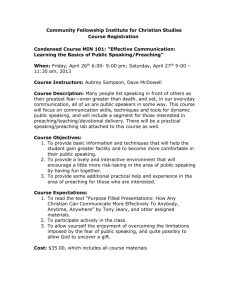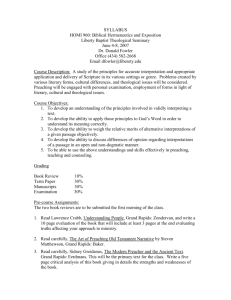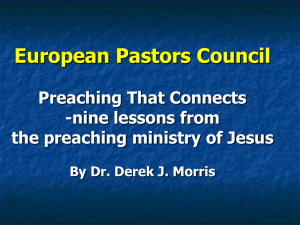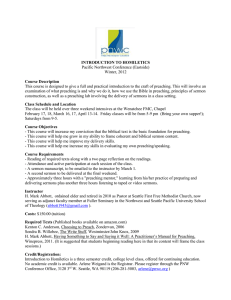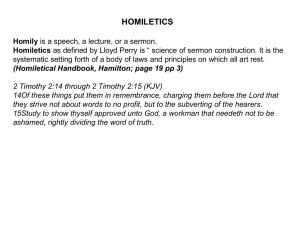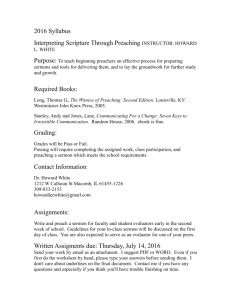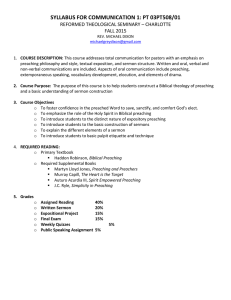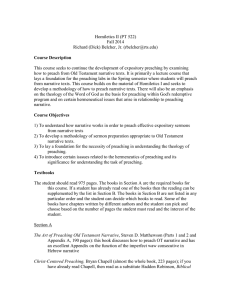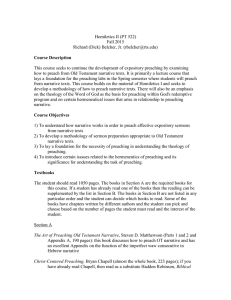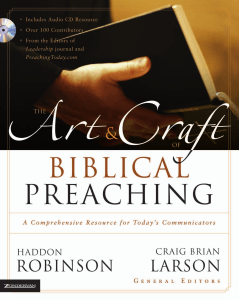Document 15628155
advertisement
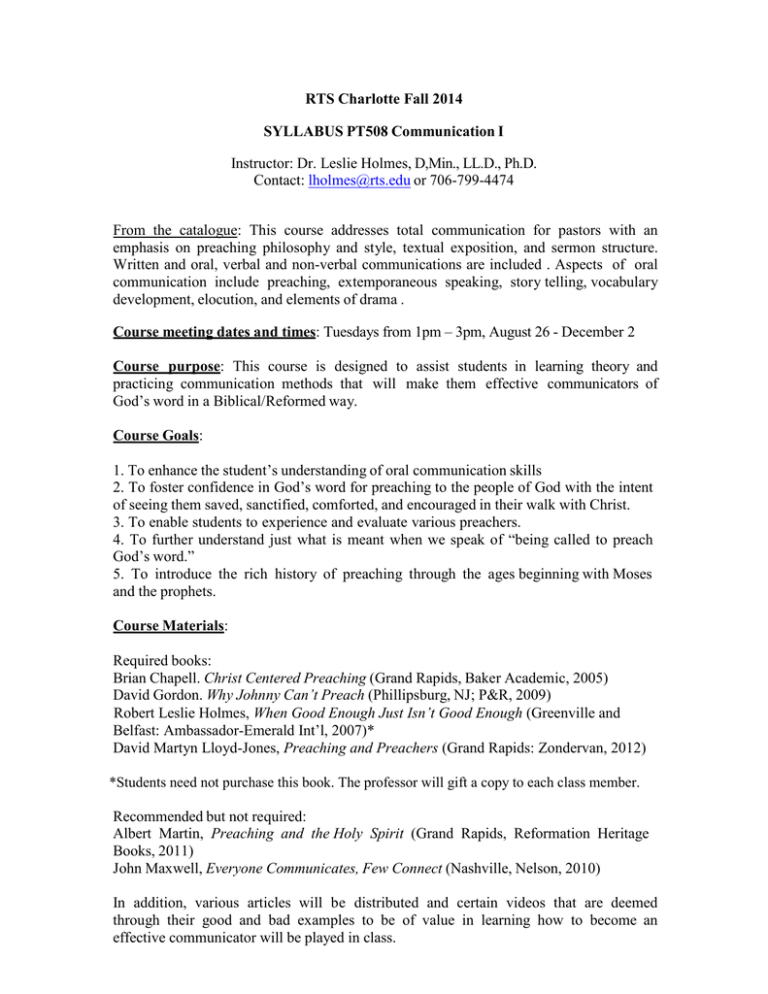
RTS Charlotte Fall 2014 SYLLABUS PT508 Communication I Instructor: Dr. Leslie Holmes, D,Min., LL.D., Ph.D. Contact: lholmes@rts.edu or 706-799-4474 From the catalogue: This course addresses total communication for pastors with an emphasis on preaching philosophy and style, textual exposition, and sermon structure. Written and oral, verbal and non-verbal communications are included . Aspects of oral communication include preaching, extemporaneous speaking, story telling, vocabulary development, elocution, and elements of drama . Course meeting dates and times: Tuesdays from 1pm – 3pm, August 26 - December 2 Course purpose: This course is designed to assist students in learning theory and practicing communication methods that will make them effective communicators of God’s word in a Biblical/Reformed way. Course Goals: 1. To enhance the student’s understanding of oral communication skills 2. To foster confidence in God’s word for preaching to the people of God with the intent of seeing them saved, sanctified, comforted, and encouraged in their walk with Christ. 3. To enable students to experience and evaluate various preachers. 4. To further understand just what is meant when we speak of “being called to preach God’s word.” 5. To introduce the rich history of preaching through the ages beginning with Moses and the prophets. Course Materials: Required books: Brian Chapell. Christ Centered Preaching (Grand Rapids, Baker Academic, 2005) David Gordon. Why Johnny Can’t Preach (Phillipsburg, NJ; P&R, 2009) Robert Leslie Holmes, When Good Enough Just Isn’t Good Enough (Greenville and Belfast: Ambassador-Emerald Int’l, 2007)* David Martyn Lloyd-Jones, Preaching and Preachers (Grand Rapids: Zondervan, 2012) *Students need not purchase this book. The professor will gift a copy to each class member. Recommended but not required: Albert Martin, Preaching and the Holy Spirit (Grand Rapids, Reformation Heritage Books, 2011) John Maxwell, Everyone Communicates, Few Connect (Nashville, Nelson, 2010) In addition, various articles will be distributed and certain videos that are deemed through their good and bad examples to be of value in learning how to become an effective communicator will be played in class. Course requirements: 1. Consistent and punctual attendance at all class sessions is expected. Except under very unusual and unavoidable circumstances, the professor must approve absences in advance. All absences will require makeup work. 2. A 3-page book report on each of the required books is expected. Each book report will outline the book and state which part of the book the student found most helpful and why. 3. Students will write a one-page analytical report on videos/articles used in class. 4. Students will make regular class presentations of all aspects of church communication. 5. A final examination will be given. Students who have a grade of A or B at the end of the semester may choose to be exempt from taking the final. Course outline: Introduction to the course Introductions What communication really is How communication really works When communication does not work The Call to Preach Christ: Internal, External, Ecclesiastical Building Trust is the First Key to Successful Communication: How do I do that? The Credibility Crisis in Modern Preaching Reading the Beatitudes: What Jesus Teaches Us About Effective Communication The Speech Communication Process Methods of Speaking Inviting Dr. Aristotle into Your Pulpit Six Principles for Effective Verbal Communication A study of Acts 2: Was Peter An Effective Communicator? What Can He Teach Us? Body Language: Using Your Body to Communicate Voice and Voice Care Issues Eat This Book! Become a Compassionate Communicator The 100 Most Frequently Mispronounced English Words Reading Holy Scripture in Public Worship: Principles and Practice Public Prayers: Let’s Eat Some CATPIE! The Place of Private Prayer in Sermon Preparation Sermon beginnings and Endings Introductions, Conclusions, Illustrations Crossing the Application Bridge Types of Sermons Finding Your Natural Type (“Preaching is truth through personality” --Phillips Brooks) Preaching the Book: Using the Lectio Continua Approach in Sermon Planning Getting the Text in Focus: Seeing What Really Is There The Bridge from the Text to the Sermon Creating Sermon Divisions Assignment Due Dates September 23 – First book report due October 7 – Second book report due October 21 – Third book report due November 11 – Fourth book report due
